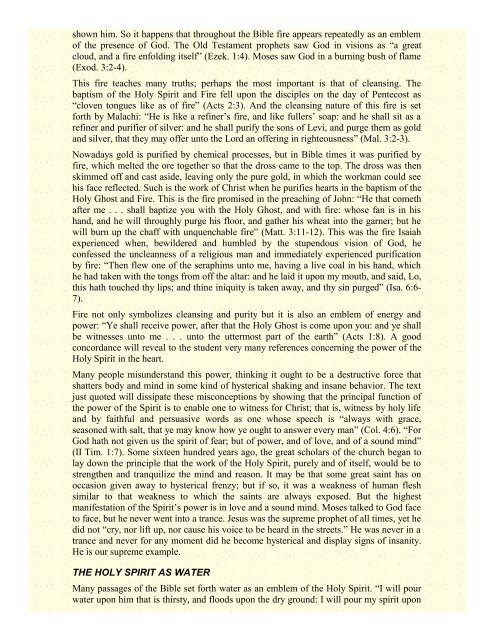2. The Meaning of Sanctification - Enter His Rest
2. The Meaning of Sanctification - Enter His Rest
2. The Meaning of Sanctification - Enter His Rest
Create successful ePaper yourself
Turn your PDF publications into a flip-book with our unique Google optimized e-Paper software.
shown him. So it happens that throughout the Bible fire appears repeatedly as an emblem<br />
<strong>of</strong> the presence <strong>of</strong> God. <strong>The</strong> Old Testament prophets saw God in visions as “a great<br />
cloud, and a fire enfolding itself” (Ezek. 1:4). Moses saw God in a burning bush <strong>of</strong> flame<br />
(Exod. 3:2-4).<br />
This fire teaches many truths; perhaps the most important is that <strong>of</strong> cleansing. <strong>The</strong><br />
baptism <strong>of</strong> the Holy Spirit and Fire fell upon the disciples on the day <strong>of</strong> Pentecost as<br />
“cloven tongues like as <strong>of</strong> fire” (Acts 2:3). And the cleansing nature <strong>of</strong> this fire is set<br />
forth by Malachi: “He is like a refiner’s fire, and like fullers’ soap: and he shall sit as a<br />
refiner and purifier <strong>of</strong> silver: and he shall purify the sons <strong>of</strong> Levi, and purge them as gold<br />
and silver, that they may <strong>of</strong>fer unto the Lord an <strong>of</strong>fering in righteousness” (Mal. 3:2-3).<br />
Nowadays gold is purified by chemical processes, but in Bible times it was purified by<br />
fire, which melted the ore together so that the dross came to the top. <strong>The</strong> dross was then<br />
skimmed <strong>of</strong>f and cast aside, leaving only the pure gold, in which the workman could see<br />
his face reflected. Such is the work <strong>of</strong> Christ when he purifies hearts in the baptism <strong>of</strong> the<br />
Holy Ghost and Fire. This is the fire promised in the preaching <strong>of</strong> John: “He that cometh<br />
after me . . . shall baptize you with the Holy Ghost, and with fire: whose fan is in his<br />
hand, and he will throughly purge his floor, and gather his wheat into the garner; but he<br />
will burn up the chaff with unquenchable fire” (Matt. 3:11-12). This was the fire Isaiah<br />
experienced when, bewildered and humbled by the stupendous vision <strong>of</strong> God, he<br />
confessed the uncleanness <strong>of</strong> a religious man and immediately experienced purification<br />
by fire: “<strong>The</strong>n flew one <strong>of</strong> the seraphims unto me, having a live coal in his hand, which<br />
he had taken with the tongs from <strong>of</strong>f the altar: and he laid it upon my mouth, and said, Lo,<br />
this hath touched thy lips; and thine iniquity is taken away, and thy sin purged” (Isa. 6:6-<br />
7).<br />
Fire not only symbolizes cleansing and purity but it is also an emblem <strong>of</strong> energy and<br />
power: “Ye shall receive power, after that the Holy Ghost is come upon you: and ye shall<br />
be witnesses unto me . . . unto the uttermost part <strong>of</strong> the earth” (Acts 1:8). A good<br />
concordance will reveal to the student very many references concerning the power <strong>of</strong> the<br />
Holy Spirit in the heart.<br />
Many people misunderstand this power, thinking it ought to be a destructive force that<br />
shatters body and mind in some kind <strong>of</strong> hysterical shaking and insane behavior. <strong>The</strong> text<br />
just quoted will dissipate these misconceptions by showing that the principal function <strong>of</strong><br />
the power <strong>of</strong> the Spirit is to enable one to witness for Christ; that is, witness by holy life<br />
and by faithful and persuasive words as one whose speech is “always with grace,<br />
seasoned with salt, that ye may know how ye ought to answer every man” (Col. 4:6). “For<br />
God hath not given us the spirit <strong>of</strong> fear; but <strong>of</strong> power, and <strong>of</strong> love, and <strong>of</strong> a sound mind”<br />
(II Tim. 1:7). Some sixteen hundred years ago, the great scholars <strong>of</strong> the church began to<br />
lay down the principle that the work <strong>of</strong> the Holy Spirit, purely and <strong>of</strong> itself, would be to<br />
strengthen and tranquilize the mind and reason. It may be that some great saint has on<br />
occasion given away to hysterical frenzy; but if so, it was a weakness <strong>of</strong> human flesh<br />
similar to that weakness to which the saints are always exposed. But the highest<br />
manifestation <strong>of</strong> the Spirit’s power is in love and a sound mind. Moses talked to God face<br />
to face, but he never went into a trance. Jesus was the supreme prophet <strong>of</strong> all times, yet he<br />
did not “cry, nor lift up, nor cause his voice to be heard in the streets.” He was never in a<br />
trance and never for any moment did he become hysterical and display signs <strong>of</strong> insanity.<br />
He is our supreme example.<br />
THE HOLY SPIRIT AS WATER<br />
Many passages <strong>of</strong> the Bible set forth water as an emblem <strong>of</strong> the Holy Spirit. “I will pour<br />
water upon him that is thirsty, and floods upon the dry ground: I will pour my spirit upon









